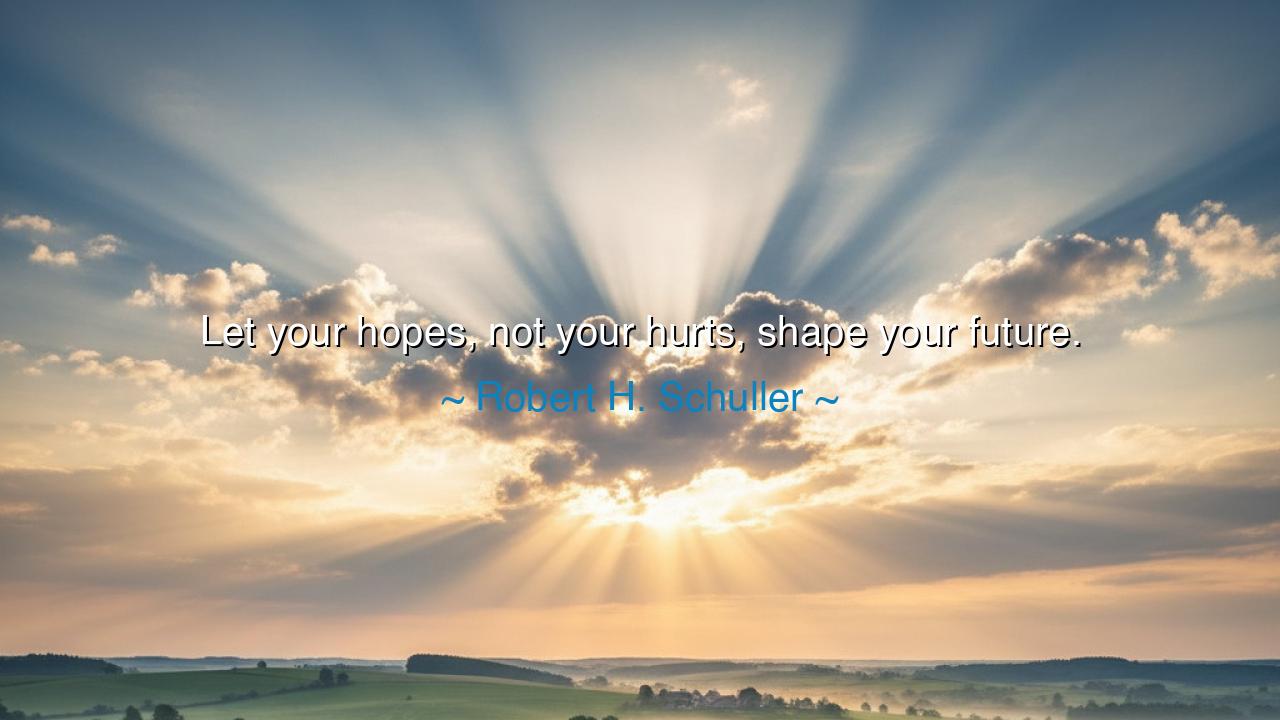
Let your hopes, not your hurts, shape your future.






In the grand sweep of time, the heart of every great story is the hero’s journey—where hope and suffering intertwine, and yet, it is the power of hope that ultimately shapes the future. Robert H. Schuller, in his profound wisdom, imparts a truth that echoes through the ages: “Let your hopes, not your hurts, shape your future.” In these words lies a powerful call to action, a summons to transcend the pain of the past and embrace the vision of what could be. To allow the scars of life to dictate our path is to remain shackled by the past, but to let our hopes lead us is to move boldly toward the promise of something greater, something yet to be created.
The great philosophers of the ancient world understood this deeply. Socrates, the master of questions, believed that it is through the mind, guided by wisdom and hope, that we free ourselves from the bonds of suffering. His teachings were not about escaping the reality of pain, but about transcending it by focusing on the higher ideals that can shape the future. Hope, in this sense, was not a passive wish, but an active force that propels us forward, even when the road is fraught with hardship. To dwell in the wounds of the past is to stagnate; to live with hope is to journey onward, shaping the future with each step we take.
Consider the story of Nelson Mandela, whose life was marked by immense suffering and personal sacrifice. Imprisoned for 27 years, he endured unspeakable hardships, yet he did not allow his hurts to shape his destiny. Instead, Mandela chose to focus on his hopes—the hope for a unified South Africa, free from the chains of apartheid. His vision for a just and equal nation became the beacon that guided him through his darkest days. Upon his release, rather than being consumed by anger or bitterness, Mandela’s heart remained centered on the future—a future he believed was possible, even after decades of injustice. His life stands as a testament to the power of hope, proving that it is hope—not suffering—that can shape the most profound of transformations.
Winston Churchill, too, faced immense personal and national suffering during the Second World War. In the darkest hours, as Britain stood on the brink of defeat, it was not the weight of the past that carried him forward, but the hope of victory. His famous words, “We shall never surrender,” were a rallying cry that emphasized the importance of hope over despair. Churchill understood that to focus on the hurts of the past would only lead to defeat, but to focus on the hope of victory, on the possibility of a better future, would give his people the strength to fight on. His example reminds us that our future is shaped not by the wounds we carry, but by the vision we hold in our hearts.
Schuller’s words point us to a deep truth: we have the power to choose how we are defined. Suffering is inevitable in the human experience, but it is not what defines us. What defines us is how we respond to that suffering, how we transform it into fuel for our journey toward the future. To allow our hurts to shape our future is to live in victimhood, to be bound by what we cannot change. But to allow our hopes to shape our future is to embrace freedom—freedom to create, to evolve, and to build a life that reflects the highest ideals of who we are meant to be.
The lesson here is profound: hope is not simply a passive emotion; it is an active force that can transform our lives. When we focus on the possibilities of the future rather than the wounds of the past, we begin to craft a life that is meaningful, vibrant, and full of purpose. The past cannot be undone, but it does not have to define our future. Hope, in its purest form, propels us forward, allowing us to transcend the pain we have endured and build a future that reflects the best of who we are.
In our own lives, let us ask ourselves: how can we choose to let our hopes shape the future? What vision do we have for tomorrow, and how can we begin to shape that vision today? The pain of the past may still linger, but it is the hope we nurture in our hearts that will shape the future we create. Let us embrace hope, let it guide our steps, and let it lead us to a future that is not bound by the hurts of yesterday, but shaped by the dreams and visions of who we can become. For it is through hope, and not through suffering, that we truly live.






AAdministratorAdministrator
Welcome, honored guests. Please leave a comment, we will respond soon